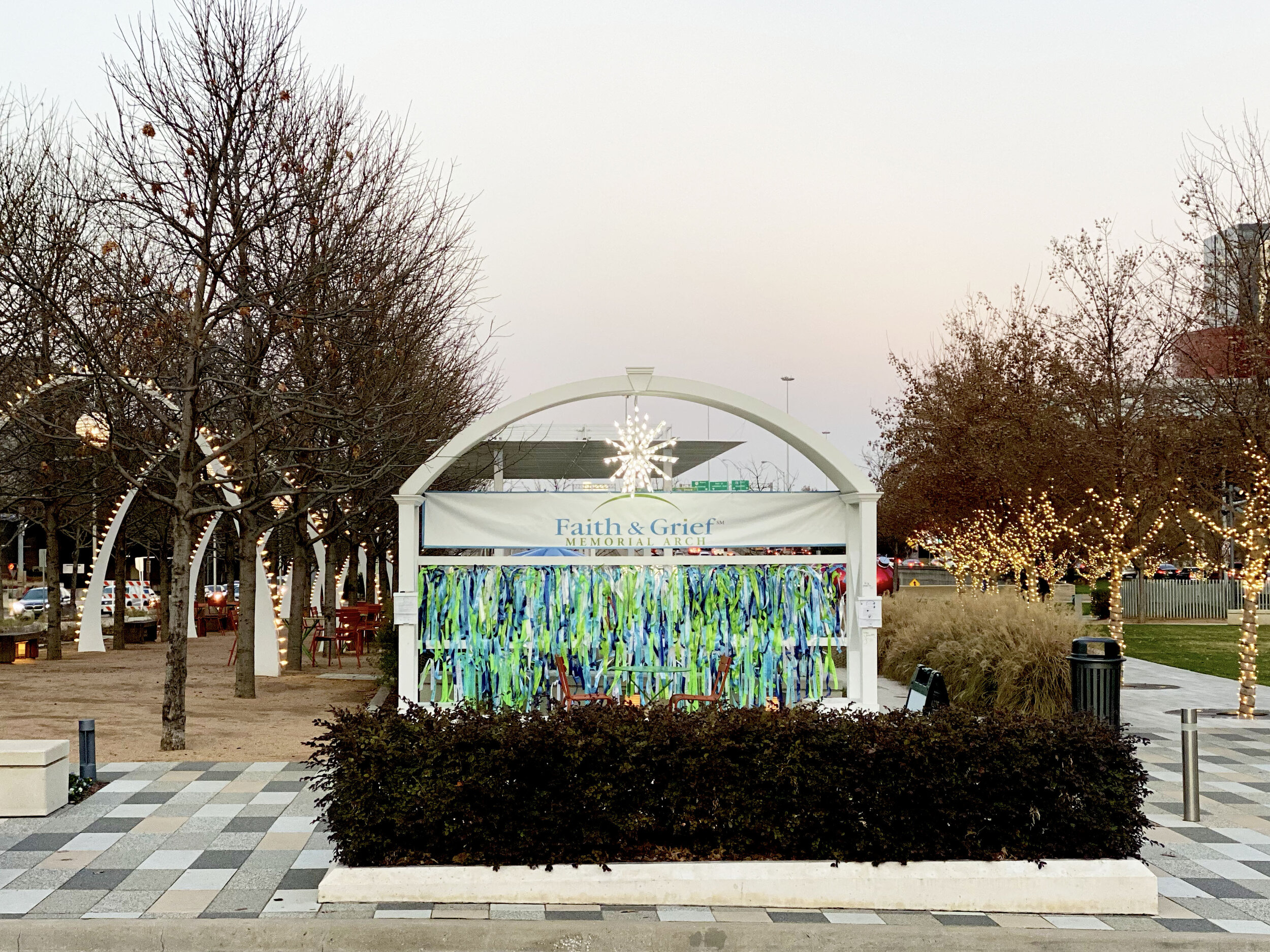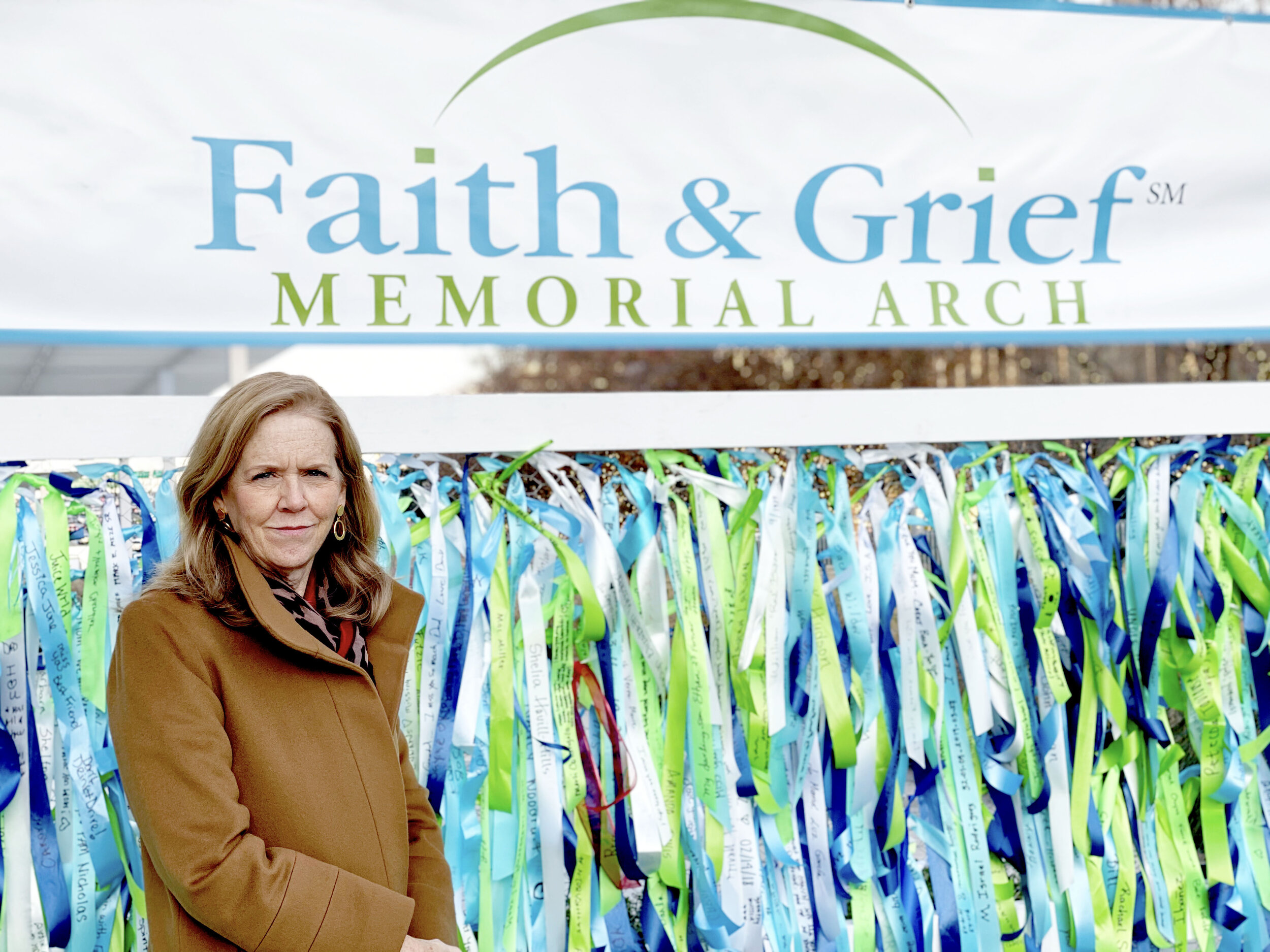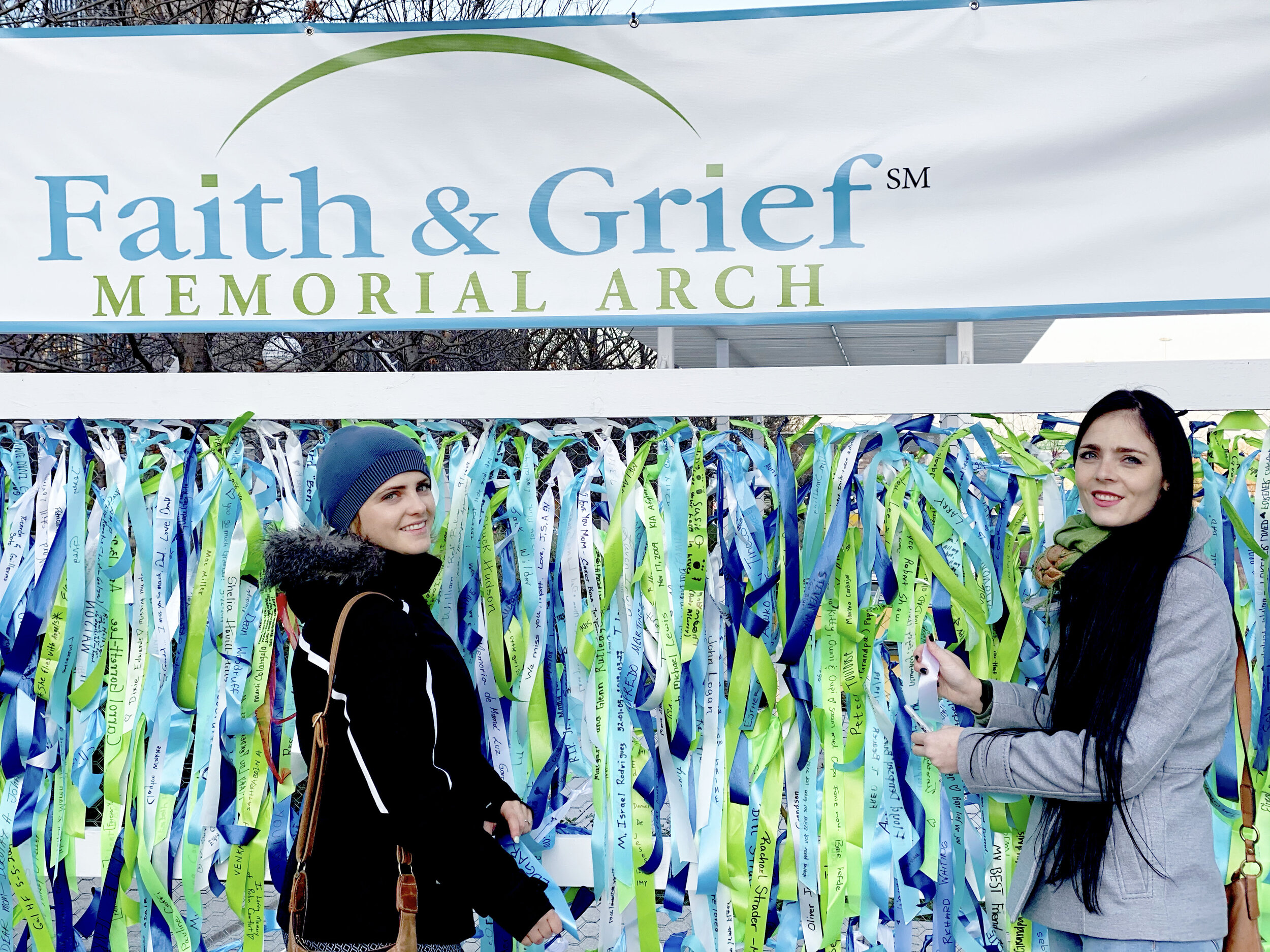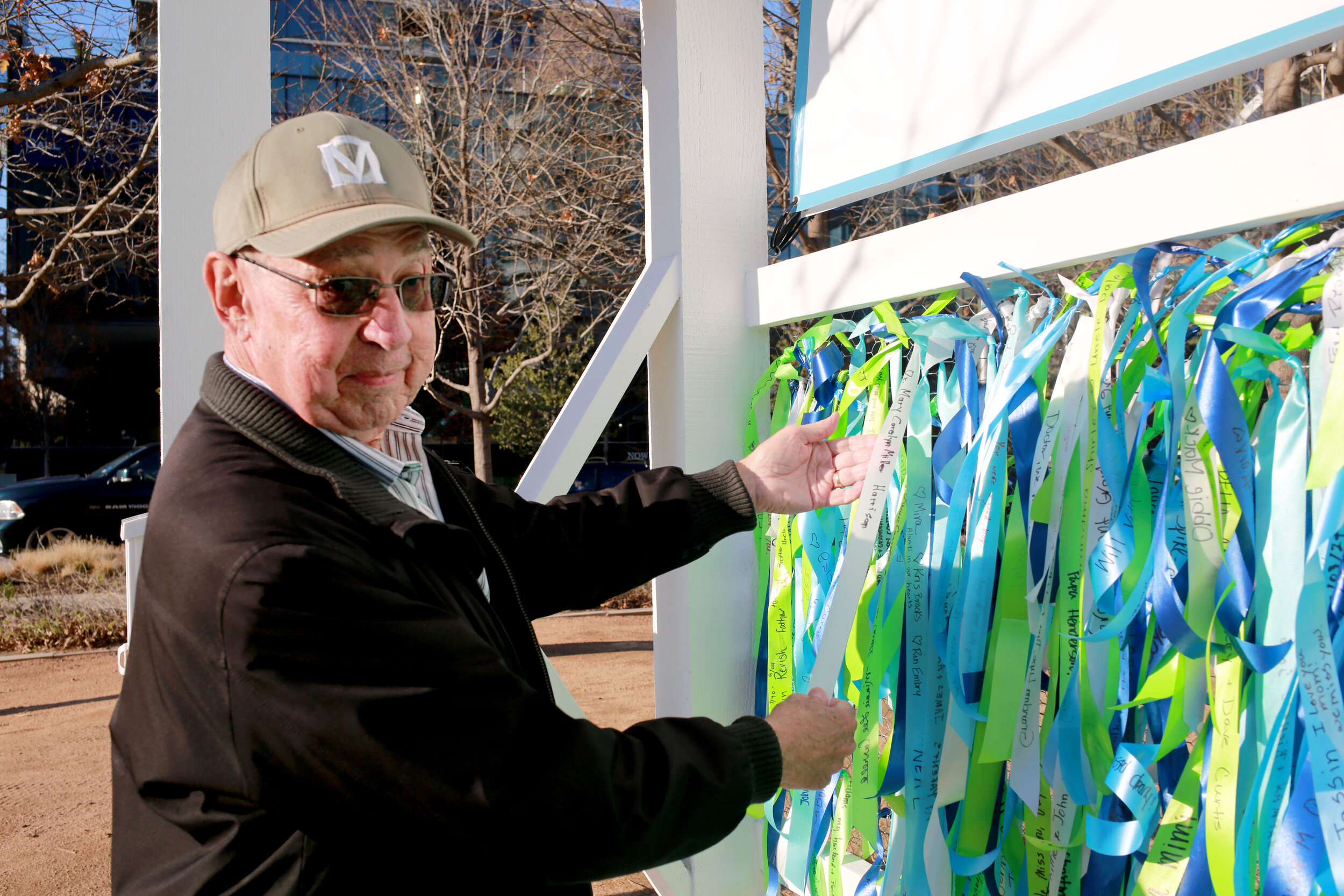Interview and Photos by Jan Osborn.
If you have been to Klyde Warren Park within the past two weeks, you probably noticed the hundreds of ribbons hanging from the white arch located on the east end near the dog park. The Faith & Grief Memorial Arch provides a place to remember your loved ones who have died. The memorial allows visitors to write loved ones’ names on ribbons and tie them to the Arch as a symbol of remembrance. Faith & Grief acknowledges the social, mental, and spiritual challenges of bereaved individuals and families surrounding the holidays, as well as the importance of remembering loved ones.

The Faith and Grief Memorial Arch on the east side of Klyde Waren Park.
Sharon Balch is one of the founders of Faith & Grief Ministries. We had the opportunity to volunteer with Sharon recently and observe how people at all stages of grief would take a ribbon, write a message to a loved one, and tie it to the Memorial Arch.
Tell us about where you grew up and how giving back was a part of your family dynamic.
I was born and raised in Springfield, Missouri along with my three older siblings. During my formative years, my father was building his business and my mother was an atypical 1960’s mother who worked full-time yet they always found ways to give back to others primarily through the programs at our church. It was this modeling of quiet service that led me to seek out ways to help others.

Sharon Balch, co-founder of Faith and Grief Ministries
You have experienced grief in connection with a loss close to you. Can you tell us what happened?
My husband, Tom, had a big personality and enjoyed life. He was a good friend to many, a loving husband, and a really fun dad. The way he told the story, we met across a conference room table in Houston. I always told him I didn’t remember that meeting but I did remember him catching my eye when he relocated to Dallas and his office was just down the hall from mine. He would also say he pursued me for a long time. Truth be told, he kept me at arms-length for more than a year. Luckily, just before I completely lost interest, he came around. We were married on a hot summer day in Dallas two years later. Our long-awaited baby boy, Evan, was born three years later and life carried us forward through jobs out of the country and back and the death of one of our parents. Then I found myself in the emergency room with Tom receiving the devastating news that he had a malignant glioblastoma brain tumor. I was 45. Evan was nine and, short of a miracle, we were going to lose the most important person in our lives. Tom died in September two years later after a valiant and much longer than expected battle. I was devastated. Evan kept saying, “it’s not fair.” I found myself with little to offer him except to say, “you’re absolutely right!” And then we began our long journey taking three steps forward and often two steps back to find our way to a new but different place. The first few months were filled with many dark days, especially during Thanksgiving and Christmas. Not long after Christmas, I distinctly remember the first day I felt rays of hope as I drove into the parking lot at work. I don’t remember how long it lasted but that brief lift in my spirits allowed me to cling to hope with assurance that we would be okay, and we are.
How did your faith carry you through your grief?
Many people say they would not have been able to survive the loss of their loved one without their faith. For others, the experience may cause a more detached relationship with their God with a range of sentiment in-between. Personally, my conversations with God during my husband’s illness were often filled with doubt and occasionally anger. My leading question was WHY? I never believed God had a hand in my husband’s cancer but he didn’t cure it either. At the time, I struggled to find even a morsel of goodness in our situation. Today, my perspective is different. I will always be grateful for how my husband’s illness and death ultimately strengthened my faith in three ways. First, I experienced occasional, miraculous moments of peace for the first time in my life which I can only attribute to the Holy Spirit demonstrating God’s presence at my side.
Second, cancer certainly wasn’t part of our well laid plans. Tom’s death reminded me more than once that while our plan may not have been God’s plan for our life, God’s plan to love and protect us never wavered. (Jeremiah 29:11).
Finally, I was led to become involved with Faith & Grief Ministries. My hope was that I could serve as an example of someone who had walked through the valley and come out on the other side. I believe this experience has provided me with the understanding to offer measures of comfort to others dealing with their own loss.

Would you share your story of how you started Faith & Grief Ministries and how it has grown?
Faith & Grief Ministries began as a monthly luncheon at Preston Hollow Presbyterian Church with the goal of providing church and community members a place to gather and share with others who have experienced the death of a loved one. The one-hour gathering model includes faith components, a short reflection, and time at table with a trained facilitator where participants can share with those who “get it.” Today there are similar gatherings at nine locations in Dallas, Richardson, Plano, Irving, El Paso, Little Rock, Kansas City, and Wyckoff, NJ. Faith & Grief also offers six-week grief workshops and grief retreats in Dallas and beyond, and provides speakers for related church and community programs.

Cousins from South Africa stop by the Memorial Arch at Klyde Warren Park to remember their beloved grandparents.
What stories have most impacted you during your time working with the Faith & Grief Community?
It is always so heartwarming to see people who attend a gathering over a period of time begin to heal. Most will come for several months or sometimes years and then perhaps drop out for a while only to return on an anniversary or during the holidays; a time when loss or sadness can become overwhelming again. My heart just soars when someone feels whole enough to begin to give back and asks if they can volunteer because they want help others.

Bill Harrison lost his wife, Mary, on December 21, 2017.
The holidays are especially hard for those who have lost loved ones. What advice can you give people who just don’t know what to say or do for those who are grieving?
Be present and avoid platitudes! In fact, it’s okay to say, I just don’t know what to say. Just let them know how sorry you are, that you are thinking of them, that you love them, and that you will check on them again in a few days, then do it. One thing I do not find helpful is “Let me know what you need.” Because a person in grief doesn’t know what they need. Just drop by with paper towels, a bag of croissants or a box of K-cups, for example.

Brianna Butler stopped by the Memorial Arch to honor her loved one.
How has learning about the ways other people grieved changed your own perspective on loss?
I’ve learned the importance of speaking your loved one’s name and telling your story over and over until you don’t need to tell it again. I’ve learned shoving your feelings down will not help you get over the loss; it will only delay the explosion when they inevitably surface. I’ve learned there is no one way to grieve; it’s a very personal journey that takes more time than we imagine.
How can people support your work and get involved?
They can volunteer at the Faith & Grief Memorial Arch at Klyde Warren Park through December 20th by visiting faithandgrief.org/gatherings/arch. They can also become a part of a leadership team or facilitator at one of the gathering locations in the area or help with other projects that come up throughout the year by visiting faithandgrief.org/donate/volunteer.
If you know someone who is Doing Good in Dallas, we’d love to hear about it! Share their story with us.